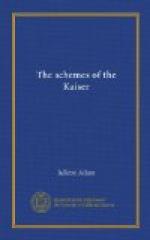[3] La Nouvelle Revue, May 1, 1890, “Letters on Foreign Policy.”
[4] La Nouvelle Revue, May 15, 1890, “Letters on Foreign Policy.”
[5] La Nouvelle Revue, June 1, 1890, “Letters on Foreign Policy.”
[6] La Nouvelle Revue, June 15, 1890, “Letters on Foreign Policy.”
[7] Several pages of the “Letters on Foreign Policy” of June 12 give proofs, undeniable and complete, that the preparation of crimes committed by anarchists in Europe was instigated at Berlin, William knowing and approving the fact.
[8] La Nouvelle Revue, July 16, 1890, “Letters on Foreign Policy.”
[9] La Nouvelle Revue, August 1, 1890, “Letters on Foreign Policy.”
[10] La Nouvelle Revue, August 16, 1890, “Letters on Foreign Policy.”
[11] La Nouvelle Revue, September 1, 1890, “Letters on Foreign Policy.”
[12] La Nouvelle Revue, September 15, 1890, “Letters on Foreign Policy.”
[13] La Nouvelle Revue, October 1, 1890, “Letters on Foreign Policy.”
[14] La Nouvelle Revue, November 1, 1890, “Letters on Foreign Policy.”
[15] La Nouvelle Revue, November 16, 1890, “Letters on Foreign Policy.”
[16] La Nouvelle Revue, December 1, 1890, “Letters on Foreign Policy.”
[17] La Nouvelle Revue, December 15, 1890, “Letters on Foreign Policy.”
[18] La Nouvelle Revue, January 1, 1891, “Letters on Foreign Policy.”
CHAPTER II
1891-1892
The danger to France of a rapprochement with Germany—The Empress Frederick’s visit to Paris—William II as summus episcopus of the German Evangelical Church—Reception of the Alsace-Lorraine deputation in Berlin—The law against espionage in Germany: every German is a spy abroad—Christening of the Imperial yacht, the Hohenzollern—Further increase of the military effective force in peace-time—The Youth of William the Second, by Mr. Bigelow.
January 12, 1891. [1]
The Berlin Post thinks that we should be able to get on very well without Alsace-Lorraine, and that the best thing for us to do, if we are “reasonable souls,” is simply to become reconciled with Germany. The reasonable ones among us are directed to prove to us others (who must needs be “gloomy lunatics”) the folly of believing in the Russian alliance, and gently to prepare us for a last and supreme act of cowardly surrender—namely, to give William II a friendly reception at Cannes or in Paris.
The chief argument with which they would persuade us is, that Berlin is quite willing to receive our philosophers and our doctors. But we are more than quits on this score, seeing the number of Germans that we entertain and enrich in Paris. To prove that we owe them nothing in the matter of hospitality, it should be enough to ascertain on the 27th inst. how many Germans will celebrate the birthday of William II in one of our first-rate hotels.




